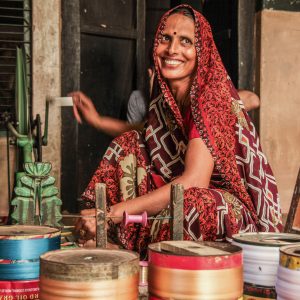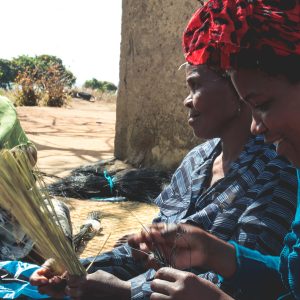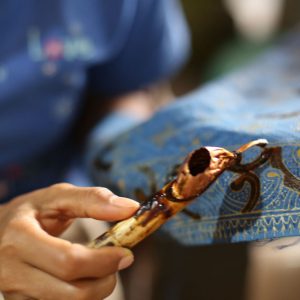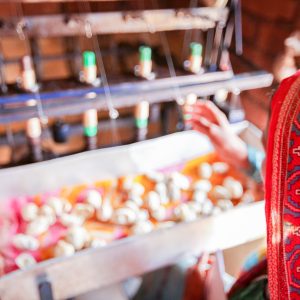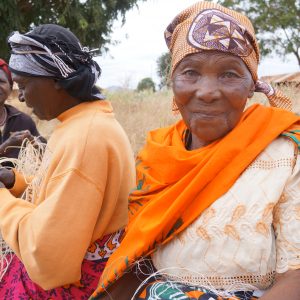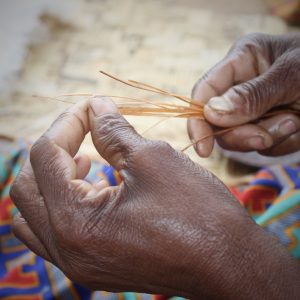For RANGE Magazine Issue Nine, we wanted to showcase an organization doing amazing work across the globe to ensure our favorite apparel, accessories and more are sustainably made in fair work environments. Naturally, the nonprofit Nest came to mind. The organization has been accomplishing a ton of growth and success recently, and since we learned so much about the organization that couldn’t fit in the printed pages of our ninth issue, we wanted to share these additional details about their great work in this interview with Nest’s Founder and Executive Director Rebecca van Bergen.
Q. How does Nest help artisans and handworkers from across the globe connect with larger brands?
A. Nest understands market access as fundamental to ensuring sustainable business growth for artisans. If we want to see artisan businesses able to pay higher wages or able to hire more employees, they need to be receiving orders from brands. Unfortunately, the way the artisan ecosystem has been historically situated has made market access very difficult. Artisan businesses have largely operated in silos without easy access to reach prospective clients.
One of the ways we address this issue is by uniting the global handworker population through our Nest Guild, a community of more than 450 artisan businesses across 75 countries globally. All Guild members are able to participate, free of charge, in a sourcing program that Nest created to match artisans and brands directly. “Directly” is the key word here. What you will see often in the marketplace today are operations functioning as artisan brokers, who are essentially middlemen between the artisan business and a brand. The brand and artisan are not given visibility to one another, which makes it impossible for them to grow a relationship. At the same time, these models are often financially structured so that payment to the middleman infringes on artisan wages.
To address these issues, Nest has created an Artisan Sourcing Directory openly listing contact details for the artisans in our Guild. Brand members who make an annual donation to Nest have access to this directory along with guidance from Nest on best practices for identifying artisan partners and working together to bring handcrafted pieces to market. Through this program, we have fostered relationships with many artisans and brands who are part of the growing class of designers embracing global craftsmanship.
Q. Unlike Fair Trade Certified, which benefits workers in factories, how does Nest’s Standards for Homes and Small Workshops and the Nest Seal of Ethical Handcraft work help handworkers who are operating from their home work spaces?
A. Many consumers, and brands for that matter, are not necessarily aware that production happening in a factory does not always stay there. Significant portions of this work–20-60% of garment production alone–is estimated to be subcontracted to home-based workers. It’s also not a straight line between the factory and homeworker, which makes that home-based producer even more invisible and his or her work even trickier to regulate. When the work leaves the factory, it passes through often several middlemen and it often enters the informal economy.
The informal economy is full of “gray areas” because it is not subject to national or local labor laws. The presence of many subcontractors alone often diffuses responsibility so that no one feels accountable for ensuring that basic codes like wage records or systems for reporting grievances are in place or upheld. Home-based workers are paid piece-rate, per item they produce, which is subject to a lot of interpretation and can make it tricky to ensure that these wages stack up to minimum or living wages. Nest has also uncovered instances of family members contributing significantly to preparatory and finishing work, but not being compensated for these contributions. For example, a woman will often prepare a loom for her husband, which is tedious and time consuming labor, yet only her husband as the weaver will receive payment.
These types of factors and more make the world beyond the factory one that requires its own set of systems for ensuring worker rights and wellbeing. About four years ago now, Nest started out on a journey to build a standardized way of assessing artisan production and home-based work because we realized that factory audits had become far less applicable beyond the factory walls. In December 2017 at the United Nations, we launched our Standards for Homes and Small Workshops in partnership with a Steering Committee of brands, including Target, West Elm, PVH, Patagonia, Eileen Fisher, and The Children’s Place. The Nest Standards are part of a training-first program designed to set artisan businesses up for success and each standard maps to remediation and further training that Nest is able to implement. Our goal is for assessment to be a springboard to change, not an end in itself.
Artisan businesses that score a certain level on the Nest assessment, become eligible for the Nest Seal of Ethical Handcraft, which artisans and brands can leverage at point of sale to educate consumers about the fact that they are purchasing an item that has been handcrafted with respect to the rights and wellbeing of those who produced it. We are looking forward to seeing the Seal in market by early 2019.
Q. What are some of Nest’s most recent accomplishments that you are especially proud of?
A. 2018 has been a year of milestones. We kicked off the year reaching 100,000 handworkers across the world. Just four years ago, we were serving about 1,500, so just a fraction of that. While reach is not the perfect measure for impact, we are proud of the way we have successfully scaled our model over the past several years so that we are more appropriately meeting the widespread need for our work. We continue to balance quantity of impact with quality by engaging with about 10 artisan businesses per year on a very in-depth level. Our “Artisan Accelerator” program leads a cohort of promising artisan businesses through a full year of 360-degree development that includes onsite pro bono consulting among other intensive means of support. This pro bono consulting is delivered through Nest’s Professional Fellowship Program, which matches artisan businesses with high level professionals for skills-based mentorship projects. Just this past month, we reached $1million in pro bono consulting services provided to more than 70 artisan businesses over the past five years through this program.
Q. How can folks in the fashion, apparel and branding industries get involved?
A. Nest support can come in so many forms and it all makes a big impact. It is critical for the industry itself to be involved in Nest’s work, so that brands are digging into their own supply chains and thinking about what opportunity there is to improve the lives of artisans or subcontracted workers producing from homes and small workshops. Nest runs several programs specifically geared towards helping brands to take these steps alongside us. We think of this as our demand-side development, which works in tandem with the supply-side development of artisan training and capacity building.
Just this year, Nest launched our Artisan Advancement Partner membership for brands. Brands make an annual minimum donation to Nest to receive access to our Sourcing Program, as well as to unlock opportunities for staged levels of consulting support from Nest. At the highest level, Nest’s Steering Committee of brands works alongside the organization to help us build global sector solutions to some of the biggest challenges standing in the way of handwork sector advancement. For example, we are currently working on a globally applicable solution to responsible wastewater management system for treating textile dyeing effluent and exploring new applications for technologies like mobile surveys and blockchains to improve our compliance program.
Q. What’s next for Nest? Are there any new and exciting developments we should be on the look out for?
A. We are really excited by the applications for our work here in the United States. We have been working on a project to make our Standards U.S. Labor Law compliant, though more funding is still needed. We will also be rolling out a few initiatives specifically for U.S.-based artisans later this year–all top secret at this time, but we look forward to unveiling more!
Images courtesy of Nest.
xx Alex

